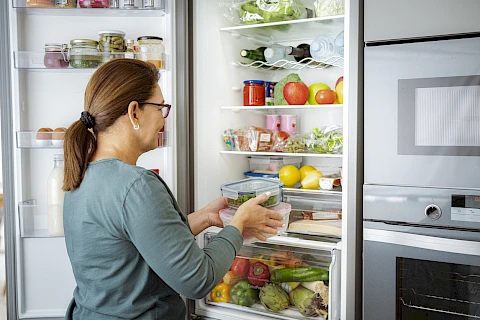
Seniors are more vulnerable to foodborne illnesses, which can lead to severe health issues. With National Food Safety Month upon us, it's the perfect time to focus on how seniors can stay safe with their food handling, storing, and reheating practices. It's to cover these topics and dispel some common food safety myths to help seniors maintain their well-being.
What Are Food Safety Needs for Seniors?
Aging changes many aspects of our lives, including how to handle food safety. Our immune systems weaken as we get older, making us more susceptible to foodborne illnesses. What might be a minor inconvenience for a younger person can lead to serious health problems for seniors. This increased risk emphasizes the importance of personalized food safety practices to help prevent illness and support better health outcomes.
Properly Storing Leftovers
Storing leftovers correctly is key to maintaining food safety. Refrigerators should be set at 40°F (4°C) or below, while freezers should be at 0°F (-18°C) or lower. These temperatures slow the growth of harmful bacteria. Refrigerated leftovers should be eaten within 3-4 days, while frozen leftovers can last much longer but are best used within 2-3 months for optimal quality and safety. Always store leftovers in airtight containers and label them with the date, so you know when they need to be eaten or discarded.
Reheating Leftovers Safely
Reheating leftovers safely is just as important as storing them correctly. When reheating food, ensure it reaches 165°F (74°C) to kill harmful bacteria. When using a microwave, stir food halfway through reheating to ensure even cooking. Use microwave-safe containers and avoid plastic wrap that could melt. To prevent cross-contamination, thoroughly wash any utensils or containers used for raw or uncooked food before reheating them.
Common Food Safety Misconceptions
Seniors must be informed about common food safety misconceptions to help them stay safe and healthy. One common myth is if food smells fine, it's fit to eat. Unfortunately, not all harmful bacteria produce odors, so food can look and smell perfectly fine but still be dangerous. Another misconception is that freezing kills all bacteria. In reality, freezing only stops bacteria from growing; they can become active once the food is thawed. You need to know you can't tell if food is bad by tasting it. Even a tiny amount of contaminated food can cause illness, so it's best not to risk your health by taste-testing questionable foods.
Additional Tips for Seniors
To further ensure food safety, here are a few more tips:
- Always wash your hands with soap and water before handling food to prevent the spread of germs.
- Keep raw meat, poultry, and seafood separate from other foods in your grocery cart and refrigerator.
- Use different cutting boards for raw and cooked foods.
- Be diligent about checking the expiration dates on foods and discard anything that is past its "use by" or "sell by" date.
Senior Helpers Spokane Can Help With Daily Living Activities
Food safety helps keep seniors safe, as they are more vulnerable to foodborne illnesses. Properly storing and reheating leftovers, understanding common food safety misconceptions, and following additional safety tips can help maintain your health. Prioritize food safety to ensure your meals are both delicious and safe. Contact Senior Helpers Spokane for personalized assistance, serving Spokane, Coeur D'Alene, Post Falls, Sandpoint, and Moscow.